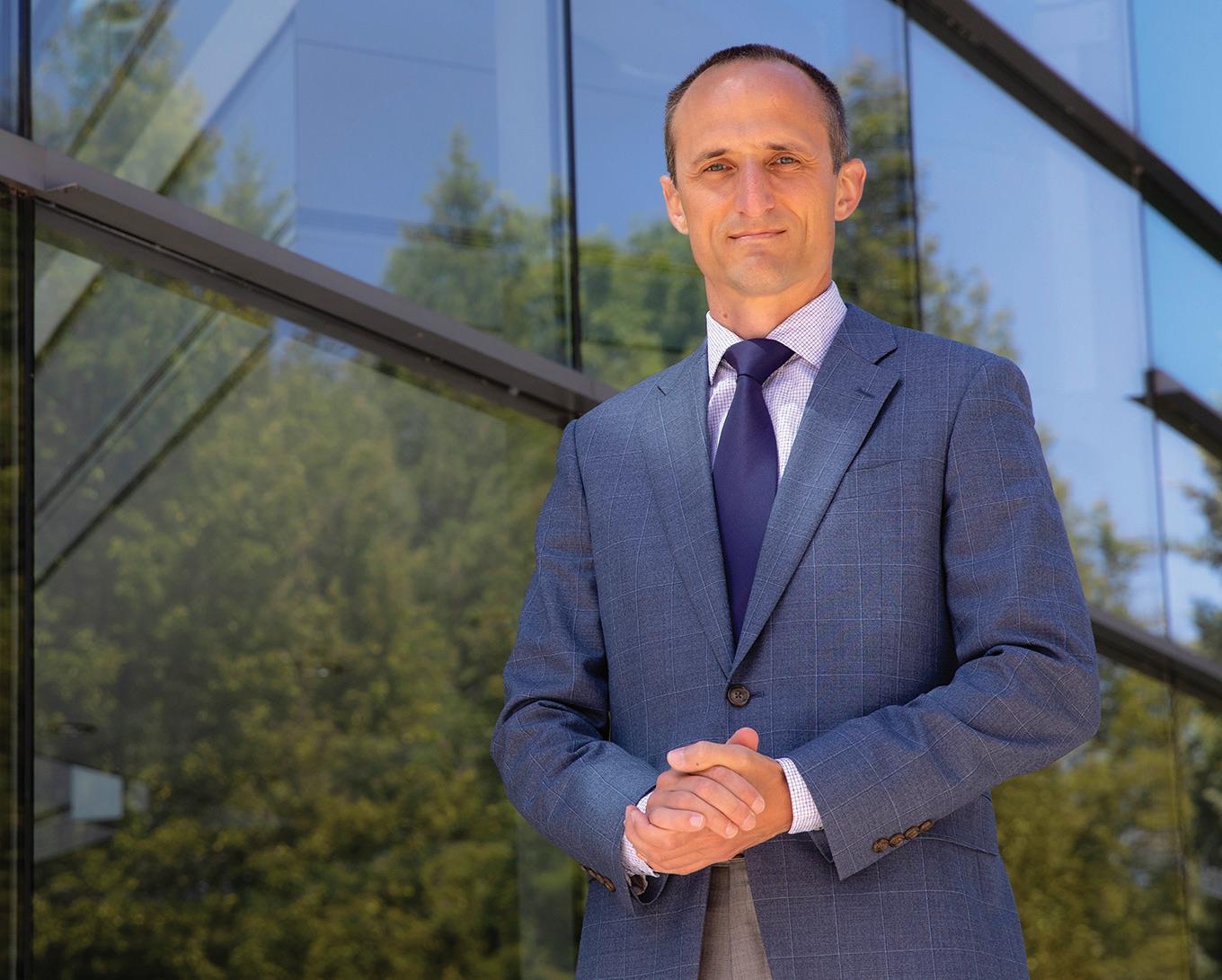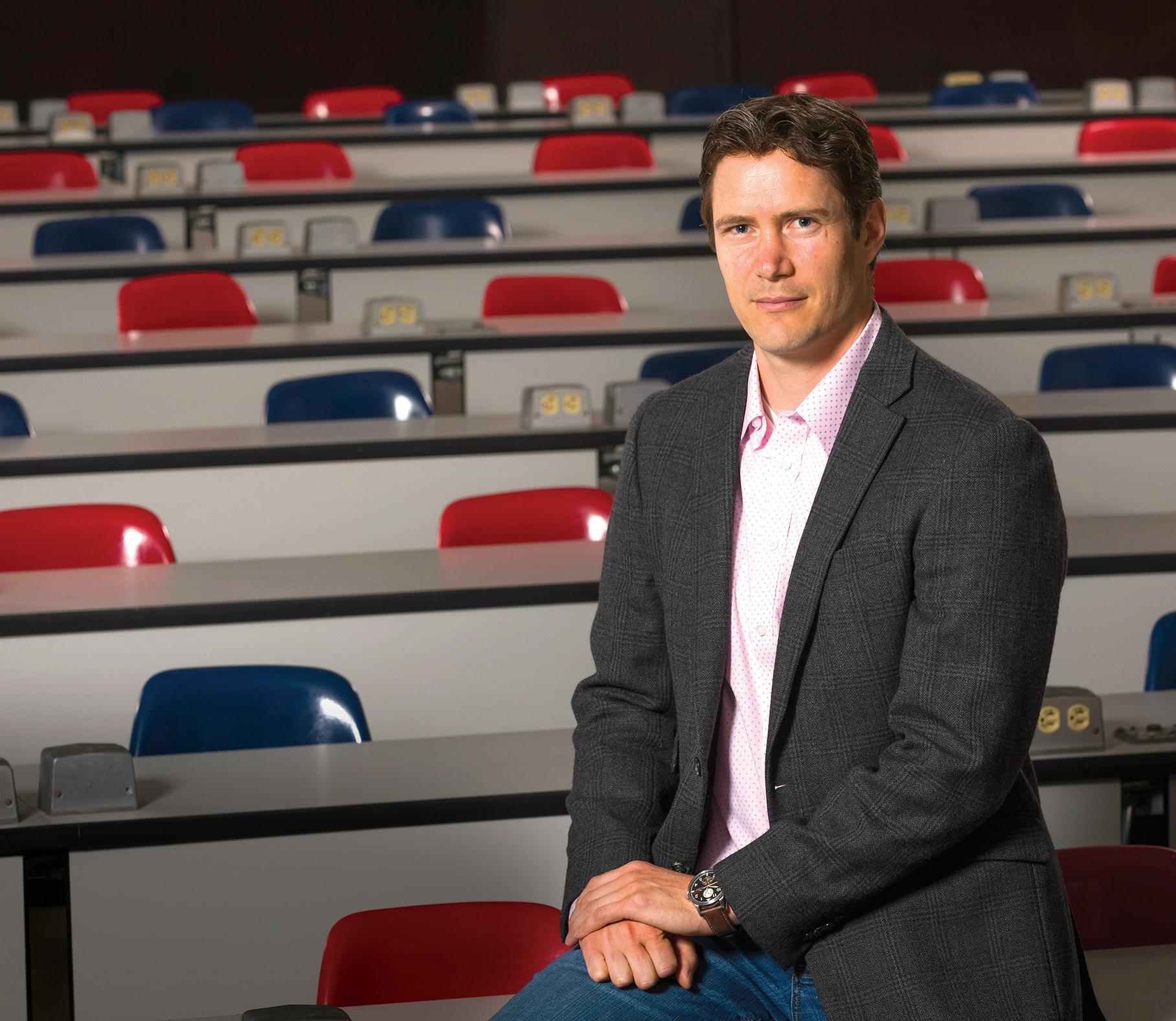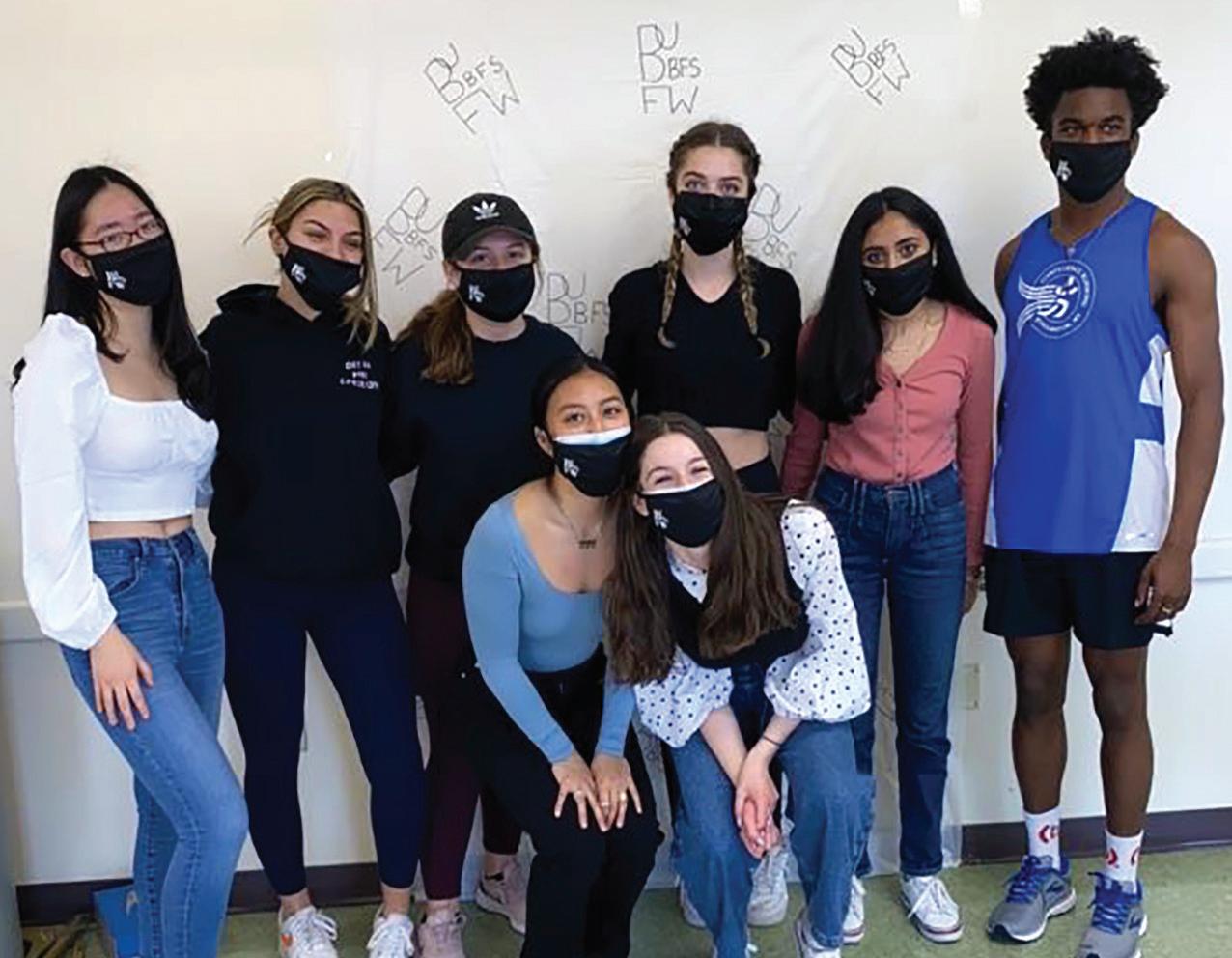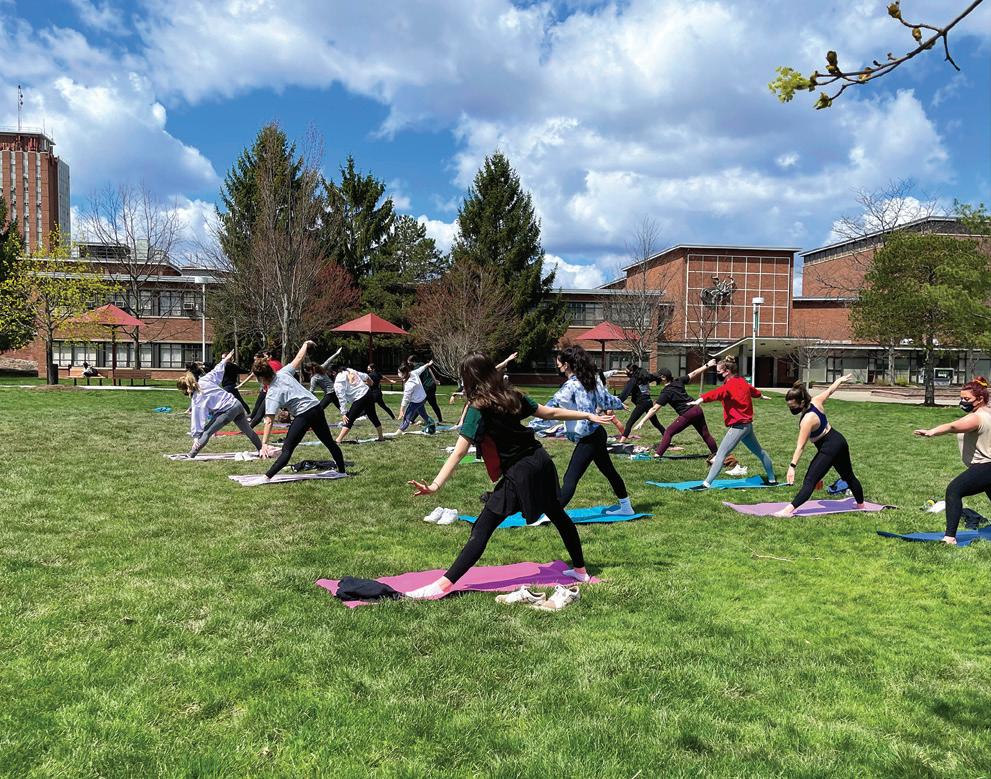
13 minute read
Helping others
MAKING A
By Allen Wengert DIFFERENCE Service members, veterans bring unique perspective to SOM
By Allen Wengert
Jocelyn Cottington ’21 at the Javits Center in Manhattan, where she helped with vaccine distribution in early 2021.
JONATHAN HEISLER
Jocelyn Cottington ’21 was wrapping up basic combat training in the Army National Guard just as COVID-19 shutdowns in the United States began.
“We didn’t have any electronics with us through basic training, so I really had no idea how serious things were,” she says. “One of the first phone calls I had was with a friend who told me that students were being sent home from college and that graduation was canceled. It was crazy.”
Cottington, a business administration major concentrating in entrepreneurship, had taken a semester off from college during her junior year to join the National Guard after conversations with recruiter Sgt. 1st Class Marlana Watson.
“She was able to let me be a guest at a National Guard drill, and I loved it. So, I enlisted and just went for it,” Cottington says.
Moving on to her advanced individual training under intense COVID protocols, Cottington became a financial management specialist, a role that allowed her to incorporate her School of Management (SOM) education into her service.
“A lot of what I learned in my classes carried over,” she says. “There are a lot of different elements that go into finance in the Army, and it’s important to make sure everything is perfect to ensure that soldiers are getting paid correctly for their work.”
Able to return to school to begin her senior year in fall 2020, Cottington opted to learn virtually from her home on Long Island, N.Y. However, just as she was beginning the spring semester — her final semester — Cottington was called into service to help with COVID-19 vaccine distribution at the Jacob K. Javits Convention Center (commonly known as the Javits Center) in Manhattan.
“At first I had no idea what to do. So, I started reaching out to all of my professors to explain the situation, and they were all so understanding,” she says.
Cottington was charged with helping ensure the vaccine distribution went smoothly, whether that meant directing people where to go or assisting nurses with administrative tasks.
While learning remotely kept her away from her friends at Binghamton, it allowed her to continue her courses and fulfill her National Guard duties. Cottington worked at the Javits Center during the day and did homework at night.
“It was very busy,” she says. “But it made me realize how much you can accomplish when you’re determined to do something.”
While much of her time in the National Guard has been defined by the COVID-19 pandemic, playing an active role in helping the country move out of it is something Cottington takes pride in.
“I’m in the National Guard, and that means my duty is to serve my country and to help in any way that I can,” she says. “It was a really awesome experience.”
Cottington had mixed feelings as she prepared to graduate in May 2021.
“I’m about to start my life in the real world and I won’t have the excuse of being in school anymore to fall back on. It’s a little nerve-wracking, but I’m definitely ready,” she says.
Despite the uncertainty that graduation brings, one thing is clear: Cottington plans to continue helping others. With a passion for fitness, she hopes to open her own gym one day.
“I like that feeling of teaching people how to do something and then watching them develop a passion for it,” she says. “I love sharing that with people.”
It’s that same drive that caused her to enlist in the National Guard in the first place. When asked what she’s most proud of, she replies, “The uniform.”
“It gives me the sense that I am part of something that’s making a real difference in the world,” she says. “People think highly of it, and I want to live up to that standard that people have. That uniform — it holds a lot of value to me.”
Neil MacLaren, MBA ’18, PhD ’21, studied the group dynamics he experienced in the Marines at SOM.
Long before he began formally studying it as a student in SOM’s PhD program, Neil MacLaren, MBA ’18, PhD ’21, had an interest in leadership and how groups come together to solve problems.
“Humans are humans, and we do things in certain ways. Across different cultures throughout history, we’ve arranged ourselves in formalized relationships. The way we work together is very similar,” he says.
After studying anthropology as an undergraduate student, MacLaren commissioned in the Marines, serving for just over a decade. His roles include having been a police transition team leader in Iraq, an infantry training advisor in Afghanistan, an assistant operations officer in Japan and a company commander aboard the USS Rushmore, a dock landing ship that transports and launches amphibious craft and vehicles.
The more he worked with different groups, the more MacLaren noticed similarities.
“I often tell people that military folks around the world are more similar to each other than different,” he says. “We deal with the same problems, we have the same goals, we have the same values and virtues. You don’t need language to understand that.”
This was especially apparent to MacLaren while interacting with military officers in Malaysia, where interpreters were scarce.
“There was a bit of a language barrier, but it didn’t matter. We shared more in common than we differed, and that allowed us to communicate effectively,” he says. “That’s what kind of clued me into the fact that there might be dynamics that are similar in all of us.”
When his wife, Katherine Wander, was hired as a faculty member in Binghamton’s Anthropology Department, MacLaren found himself looking for his next steps. He eventually enrolled in SOM’s MBA program, where he learned about research dedicated to studying the dynamics he observed during his time in the Marines.
“I’d be sitting in class wondering how all of these academics knew this stuff,” he laughs. “These were experiences that are important to me, but I didn’t have words for them in the same way that I do now. I didn’t even realize you could study things like this until I was in the MBA program.”
MacLaren remained in SOM to pursue his PhD, concentrating in leadership and organizational science.
“I did my PhD at Binghamton because of who’s here. There are people here doing interesting research. There’s a lot going on here and I wanted to be a part of that,” he says.
Graduating in 2021, MacLaren feels the program was a good fit for him.
“In terms of teaching and focusing on the practical applications of knowledge, that idea of ‘let’s do something, let’s teach something that people can benefit from’ — I think that’s something that a lot of veterans place value in.”


For Remington Curtis, assistant professor of accounting, a deployment in Iraq inspired him to pursue teaching.
“It changed my perspective on what I wanted to get out of life,” he says. “I became interested in opportunities that would allow me to help build individuals up and make a positive impact on the world.”
Growing up in a military family, Curtis moved around quite a bit, but completed high school in Utah. After studying accounting at Utah State University, he simultaneously worked full time in the industry while enlisting in the Army National Guard.
As a medical logistics officer in the 19th Special Forces Group, Curtis was responsible for overseeing medical supply chains in the military. The position gave him an opportunity to develop a host of interpersonal skills, especially during his deployment in 2010.
“When you’re in charge of logistics, it means that you can acquire things to help smooth the skids in other areas,” he says. “Our special forces teams would be brokering agreements with locals, and oftentimes it would boil down to ‘if we can provide their village with flu shots they will support our teams.’ And that’s where we had opportunities to really help.”
As he worked his way up to the rank of captain, the leadership opportunities Curtis received had a profound impact.
“You’re given leadership opportunities and training that you usually don’t get until much further into your civilian career. That includes actual, direct leadership where you’re speaking and overseeing certain opportunities or obstacles, or you’re put in front of important people and expected to prepare and present information to them. You’re held accountable for the people underneath you and their actions,” he says.
Curtis incorporates anecdotes and lessons from his time in the National Guard into his accounting courses.
“An aspect of accounting that I try to emphasize to my students is the importance of documentation. Not only do you need to have documentation, it has to be appropriate documentation,” he says. “I also try to help them understand the importance of resiliency and adaptation and supporting others — and trusting that others will support you as well. There are a lot of aspects of the military that can apply to students professionally.”
Curtis believes veterans possess a skill set that can be valuable in an academic setting, especially when it comes to collaboration and problem solving.
“Veterans excel in collaborative settings as both leaders and in supportive roles. Relatedly, there is a rich diversity in the military, and working in this environment enhances a veteran’s understanding of the benefits of diversity,” he says. “Veterans are also exceptional problem solvers and are very comfortable adapting to unexpected challenges, like those presented by COVID-19.”
Curtis feels his current role still allows him to help others.
“I enjoy teaching and really love the opportunities to mentor students,” he says. “Overall, I do feel like I am making a small, but positive, impact on the world around me.”
Remington Curtis, assistant professor of accounting, decided to pursue teaching after a deployment in Iraq.
The hustle never ends
New graduate Rene Vorilas is driven to succeed
by Natalie Blando-George
Looking around Rene Vorilas’ college room, you’d never know you’re standing in the headquarters and manufacturing center of a thriving fashion business. But look under the bed and you’ll find an impressive array of shipping materials and a bin of high-end denim jackets. Under her roommate and business partner’s bed are more bins, these filled with paint and textile media.
Vorilas, who graduated in May from the School of Management’s business administration program, co-founded a clothing business called Dio Alpha in June 2018. The company offers custom, handpainted denim jackets in a few boutiques on Long Island, N.Y., at vendor fairs and on Etsy. >

Ever since I can remember, my dad has said, ‘Successful people do the things that unsuccessful people aren’t willing to do.’”


Binghamton Fashion Business Society events during the spring 2021 semester: fashion show with Confluence Running (left) and socially distanced yoga (top).
Demand for the unique, premium jackets has been steady, and interest spikes whenever Vorilas posts products on social media. Orders also increased after TV personality Gina Kirschenheiter wore a Dio Alpha jacket on Bravo’s Real Housewives I want to create of Orange County. But, with only herself and her things and watch partner doing all the work, Vorilas has intentionally them grow...” limited Dio Alpha’s growth. “We’ve always wanted to keep Dio Alpha small so we can focus on quality,” she says. “Each jacket takes a long time because they’re hand-painted and one-ofa-kind, and we’re full-time students!” Dio Alpha is the fourth company the 21-year-old has started. She founded the first at just 8 years old, creating flower pens from duct tape and raising $2,500 for St. Jude Children’s Research Hospital. Four years later, Vorilas began her first fashion enterprise: Swag Shorts, which offered dip-dyed, embellished cutoff denim shorts. At age 15, she founded Lahoni Co., a clothing and accessories line that promoted living life to the fullest and contributed a percentage of its profits to organizations that protect endangered turtles. Vorilas chose to attend Binghamton University for college, basing her decision on the University’s reputation and the positive experience her brother had at Binghamton’s Harpur College of Arts and Sciences. While she initially intended to pursue law and entered Harpur College, by her sophomore year she had transferred into SOM.
“I love figuring out how to make things better, how to move them forward,” she says. “I want to create things and watch them grow, so I decided I should be in business school.”
When it came time to look for a summer internship, Vorilas found that SOM didn’t have any fashion-related offerings. So she forged ahead on her own, securing an internship at Brooks Brothers in New York City. Upon returning to the University in the fall, Vorilas and another SOM student who also located his own internship in the fashion industry joined forces to create the Binghamton Fashion Business Society, an organization for students with an interest in the business of fashion.
Within a few days of telling people about the club, which is open to any Binghamton student, the society’s Instagram account had 250 followers. The group assembled an administrative board and successfully held well-attended events. Then, the pandemic hit.
The Binghamton Fashion Business Society quickly pivoted online, launching a virtual speaker series featuring professionals from across the fashion industry, capitalizing on contacts and information Vorilas gained during her summer at Brooks Brothers.
The society’s Instagram account now has over 700 followers, with members who are engaged and

FAST FACTS
> Rene Vorilas is from West Islip, N.Y.
> She is one of two 2021 SOM Seniors of the Year.
> Her favorite course was LEAD 353: Strategic
Leadership, where her team consulted for the
Endicott Performing Arts Center.
> Vorilas liked LEAD 353 so much that she became a course teaching assistant for Associate Professor
Kim Jaussi.
> During quarantine, Vorilas sewed more than 200
masks and donated them to essential workers and the military.
> Vorilas has been involved in musical theater and
taught herself the ukulele.
> At the age of 6, she sold a $100 raffle ticket at a church fair in a couple of minutes — she got five more and sold them in 5 minutes.
> Vorilas advises other students to stay true to who they are: “Follow your heart and do what you want to do. Don’t let anyone tell you that you can’t.”
active. But, most important to Vorilas: Members tell her the club has positively impacted their college experience.
“It’s so amazing to see how many people are genuinely interested in this club and care about its future,” says Vorilas, who is also president of the University’s Hellenic Cultural Society. She adds that she has met with prospective students who want to learn more about the fashion society before deciding to attend Binghamton.
Having been CEO of four companies and president of two student organizations, Vorilas says leadership is an inherent talent of hers.
That take-charge attitude propelled her to the next step after graduation: She accepted a position as a consultant with Protiviti, a Manhattan consulting firm where she completed her senior internship.
While she says she’ll have to step back from Dio Alpha, she knows she’ll be running her own business again in the future.
“I want to follow my passions the way they are and never have to hold back because of someone else’s rules or barriers,” she says.





